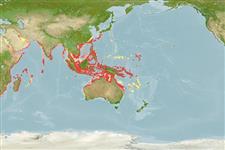>
Eupercaria/misc (Various families in series Eupercaria) >
Gerreidae (Mojarras)
Etymology: Gerres: Latin, gerres = a kind of anchovies; cited by Plinius.
More on author: Cuvier.
Environment: milieu / climate zone / depth range / distribution range
Écologie
marin; eau douce; saumâtre démersal; amphidrome (Ref. 51243); profondeur 1 - 50 m (Ref. 4372). Tropical; 26°C - 29°C (Ref. 4959); 32°N - 35°S, 25°E - 171°E
Indo-West Pacific: East Africa and Madagascar to Japan and Australia; New Caledonia (Ref. 26587) and Vanuatu (Ref. 13300). Enters rivers and lakes in Madagascar and the east coast of Africa. Not in the Middle East (Ref. 103159).
Length at first maturity / Taille / Poids / Âge
Maturity: Lm 19.0 range ? - ? cm
Max length : 39.0 cm TL mâle / non sexé; (Ref. 116875); common length : 15.0 cm SL mâle / non sexé; (Ref. 4967)
Épines dorsales (Total) : 9; Rayons mous dorsaux (Total) : 10 - 11; Épines anales: 2 - 3; Rayons mous anaux: 7 - 8.
Adults are coastal inhabitants found on soft bottoms (Ref. 44894), over sandy substrate (Ref. 12693). Juveniles are found in brackish mangrove estuaries, sometimes enter fresh water (Ref. 2847, 44894), lakes (Ref. 4323), tidal creeks (Ref. 44894) and lower freshwater reaches of rivers (Ref. 12915). Feed on small crustaceans, polychaetes and forams on sand or muddy-sand bottoms (Ref. 12915), worms and insect larvae (Ref. 12693). Length at first reproduction was reported to be around 12 cm SL, for a population in a South African estuary (D. Woodland, pers.comm. 07/13). Salted or made into fish sauce.
Juveniles enter estuaries and mangrove areas at 1 cm SL and stay until they reach maturity, at which stage they move out to sea (Ref. 36558).
Woodland, D.J., 1984. Gerreidae. In W. Fischer and G. Bianchi (eds.) FAO species identification sheets for fishery purposes. Western Indian Ocean fishing area 51. Vol. 2. [pag. var.]. FAO, Rome. (Ref. 3409)
Statut dans la liste rouge de l'IUCN (Ref. 130435)
Menace pour l'homme
Harmless
Utilisations par l'homme
Pêcheries: intérêt commercial mineur
Outils
Articles particuliers
Télécharger en XML
Sources Internet
Estimates based on models
Preferred temperature (Ref.
123201): 24.8 - 29.1, mean 28.2 °C (based on 1220 cells).
Phylogenetic diversity index (Ref.
82804): PD
50 = 0.5000 [Uniqueness, from 0.5 = low to 2.0 = high].
Bayesian length-weight: a=0.01230 (0.01004 - 0.01507), b=3.05 (3.01 - 3.09), in cm total length, based on LWR estimates for this species (Ref.
93245).
Niveau trophique (Ref.
69278): 3.3 ±0.2 se; based on diet studies.
Résilience (Ref.
120179): Haut, temps minimum de doublement de population inférieur à 15 mois (K=0.7).
Fishing Vulnerability (Ref.
59153): Low to moderate vulnerability (32 of 100).
Nutrients (Ref.
124155): Calcium = 140 [77, 253] mg/100g; Iron = 1 [1, 2] mg/100g; Protein = 18.7 [16.8, 20.5] %; Omega3 = 0.24 [0.13, 0.42] g/100g; Selenium = 47.4 [26.5, 88.1] μg/100g; VitaminA = 18.7 [5.9, 46.9] μg/100g; Zinc = 1.42 [0.97, 1.98] mg/100g (wet weight);
